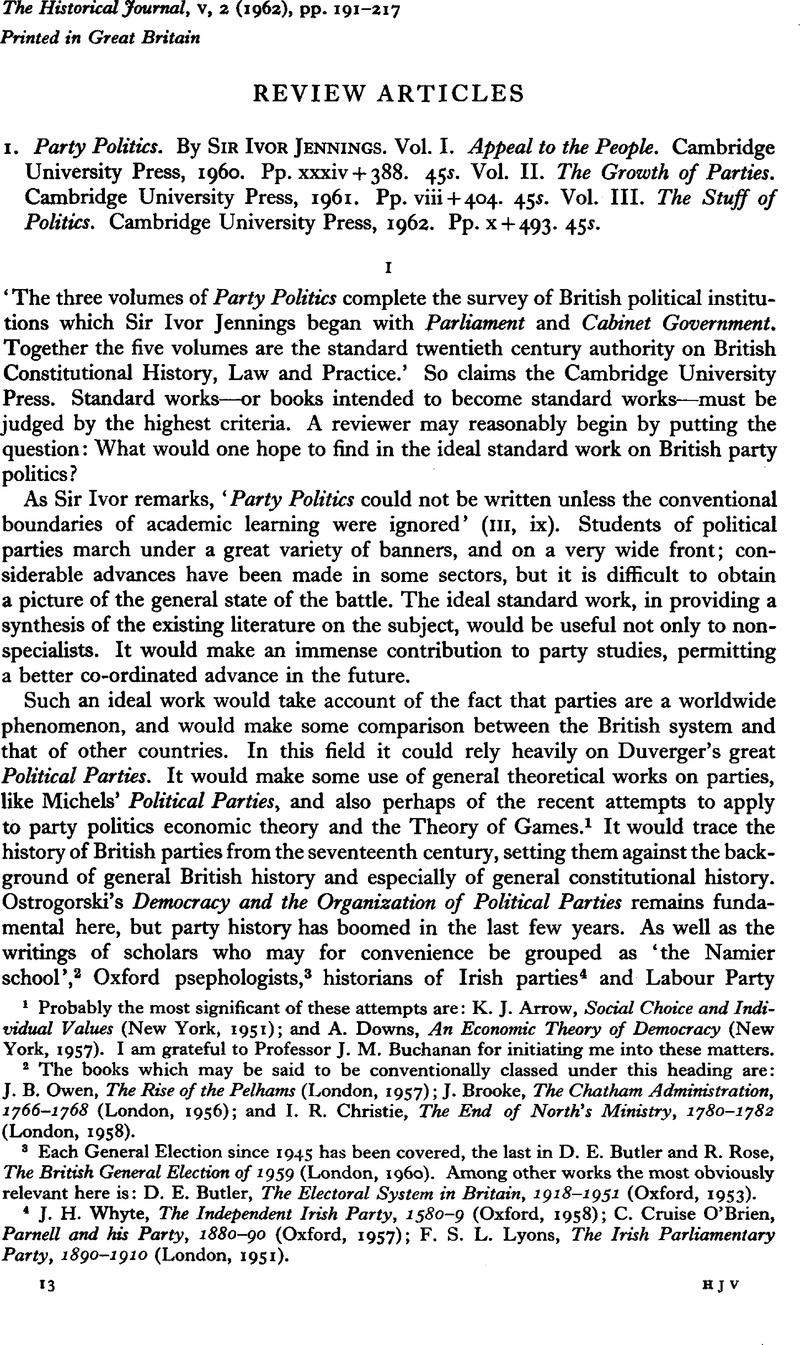No CrossRef data available.
Article contents
Abstract

- Type
- Review Articles
- Information
- Copyright
- Copyright © Cambridge University Press 1962
References
1 Probably the most significant of these attempts are: Arrow, K. J., Social Choice and Individual Values (New York, 1951)Google Scholar; and Downs, A., An Economic Theory of Democracy (New York, 1957).Google Scholar I am grateful to Professor J. M. Buchanan for initiating me into these matters.
2 The books which may be said to be conventionally classed under this heading are: Owen, J. B., The Rise of the Pelhams (London, 1957)Google Scholar; Brooke, J., The Chatham Administration, 1766–1768 (London, 1956)Google Scholar; and Christie, I. R., The End of North's Ministry, 1780–1782 (London, 1958).Google Scholar
3 Each General Election since 1945 has been covered, the last in Butler, D. E. and Rose, R., The British General Election of 1959 (London, 1960).Google Scholar Among other works the most obviously relevant here is: Butler, D. E., The Electoral System in Britain, 1918–1951 (Oxford, 1953).Google Scholar
4 Whyte, J. H., The Independent Irish Party, 1580–9 (Oxford, 1958)Google Scholar; O'Brien, C. Cruise, Parnell and his Party, 1880–90 (Oxford, 1957)Google Scholar; Lyons, F. S. L., The Irish Parliamentary Party, 1890–1910 (London, 1951).Google Scholar
5 E.g. Pelling, H., The Origins of the Labour Party, 1880–1900 (London, 1954)Google Scholar; Poirier, P. P., The Advent of the Labour Party (London, 1958)Google Scholar; Bealey, F. and Pelling, H., Labour and Politics, 1900–1906 (London, 1958)Google Scholar; Lyman, R. W., The First Labour Government, 1924 (London, 1957).Google Scholar
6 E.g. Benney, M., Gray, A. P. and Pear, R. H., How People Vote (London, 1956)Google Scholar; Milne, R. S. and MacKenzie, H. C., Straight Fight (London, 1954)Google Scholar, and Marginal Seat (London, 1958); Finer, S. E., Anonymous Empire (London, 1958)Google Scholar; Stewart, J. D., British Pressure Groups (Oxford, 1958).Google Scholar
7 Aspinall, E. G. A., ‘English Party Organization in the Early Nineteenth Century’, English Historical Review, XLI (1926), 389–411CrossRefGoogle Scholar; Aspinall, A., ‘The Reporting and Publishing of the House of Commons Debates, 1771–1834’, in ed. Pares, R. and Taylor, A. J. P., Essays Presented to Sir Lewis Namier (London, 1956), 227–57Google Scholar; and, more recently, Fraser, P., ‘Public Petitioning and Parliament before 1832’, History, XLVI (1961), 195–211CrossRefGoogle Scholar, and ‘The Growth of Ministerial Control in the Nineteenth-Century House of Commons’, English Historical Review, LXXV (1960), 444–63.CrossRefGoogle Scholar
8 See vol. II, ch. xxxv, especially pp. 76 n. and 79 n.
9 Cf. O'Leary, C., The Elimination of Corrupt Practices in British Elections, 1868–1911 (Oxford, 1962), 28 and 44 n.Google Scholar
10 It was not only Queen's Bench judges who were eligible to become election judges.


